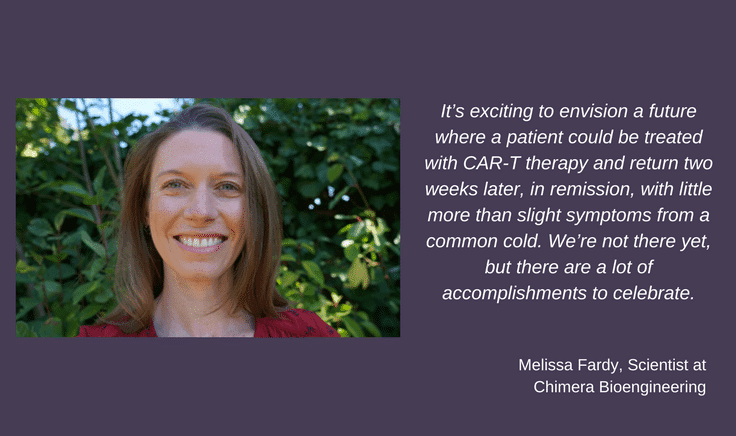Engineered Human Therapies
Synthetic Biology and Immunotherapy to Bring More Effective Cell Therapies for Cancer
Sep 22, 2017
For years, the foundations of cancer treatment were chemotherapy, surgery, and radiation therapy. But over the past several years, progress with therapies that collect and use a patient’s own immune cells to attack tumors (in other words, immunotherapy) have greatly accelerated. Leading the charge among immunotherapies is CAR-T cell therapy, the first variety of which was approved last month by the US FDA.As its name implies, the backbone of CAR-T cell therapy is T cells, which play a critical role in killing cells infected by pathogens. The therapy works by collecting blood from patients and isolating their T cells from these samples. These cells are engineered in the lab to produce receptors on their surface called chimeric antigen receptors, or CARs. The receptors allow T cells to recognize and attach to a specific protein, or antigen, on tumor cells. The cells are then grown in the lab and multiplied into the hundreds of millions. Finally, the CAR-T cells are infused back into the patient. If all goes as planned, the engineered cells further multiply in the patient’s body, recognizing and killing cancer cells that harbor the antigen on their surfaces.One of the companies working on this technology is Chimera Bioengineering, co-founded by renowned synthetic biologist Professor Christina Smolke of Stanford University. Chimera is a resident at JnJ’s prestigious JLABS incubator in South San Francisco and has the support of StartX, the Stanford affiliated accelerator, as well as Illumina Accelerator. Chimera leverages a combination of synthetic biology and immunotherapy to bring more effective and safer CAR-T therapeutics to cancer patients.To learn more, we interviewed Melissa Fardy, a scientist at Chimera, who will be speaking in the Cell Factories for Biopharmaceuticals and Healthcare session (Sponsored by Synthetic Genomics) at SynBioBeta SF 2017 on October 3rd.Why are CAR-T cell therapies such an exciting field to be part of at the moment?We each have nature's most advanced anti-cancer system, our own immune system, constantly doing work, clearing malignant, infectious, or disease-causing cells, all the while we are none the wiser. CAR-T therapy is tweaking what nature has created, empowering patients to fight and eradicate cancer leveraging their own immune systems.It’s exciting to envision a future where a patient could be treated with CAR-T therapy and return two weeks later, in remission, with little more than slight symptoms from a common cold. We’re not there yet, but there are a lot of accomplishments to celebrate. CAR-Ts have been hugely successful in providing curative treatment to patients with refractory leukemia and with Novartis’s seminal FDA approval of their Kymriah treatment just last month, the door has swung wide open for a plethora of other immunotherapies, including CAR-T treatment for solid tumors. Can you tell us about your projects at Chimera Bioengineering?Despite tremendous progress in certain indications, immunotherapy remains, like chemotherapy or radiation, a blunt instrument against cancer. It often comes with side effects that are not only potentially fatal, but, importantly, scary, dehumanizing and demeaning. At Chimera we engineer CAR-T cell immunotherapies to not only enhance efficacy against difficult-to-treat tumors, but also reduce toxic side effects and restore dignity to patients. Our two primary projects, SUGR and GOLD, leverage synthetic RNA-based control systems for rapid, real-time tuning and more efficacious CAR-Ts. We believe that RNA-based control systems are ideal for cell therapies because they function without the immunogenic side effects that can greatly limit protein-based control systems.Our SUGR platform enables small-molecule control of CAR expression, making it possible to titrate the intensity of CAR-Ts based on traditional pharmacological dosing strategies. Our second RNA-based platform, GOLD, can supercharge CAR-Ts by conditionally delivering high levels of powerful therapeutic payloads, such as cytokines and checkpoint inhibitors, directly at the site of the tumor. What challenges persist in your field, and what progress has your team – or other peers – made in overcoming them?One of the greatest challenges for CAR-T therapy is control. Because CAR-Ts are living therapies it’s impossible to control the dosage once the cells are infused into the patient. Unlike traditional therapies where higher dosages lead to increased efficacy, the immune system requires a delicate balance. Unpredictable T-cell proliferation can create situations that are ‘too hot’ or ‘too cold' leading to runaway toxicity or ineffective tumor clearance. Chimera’s SUGR technology can directly address this problem by allowing physicians to tune the CAR expression so the T-cell activation and proliferation is ‘just right’ for each patient.CAR-Ts can also struggle to mount an effective response within the immunosuppressive microenvironment of solid tumors. Therapeutic payload delivery directly within the tumor microenvironment can help counteract these issues and even boost the CAR-T activity. Chimera’s GOLD platform uses the CAR-T cells as factories to produce compounds that remodel and deactivate the microenvironment. These compounds (cytokines, checkpoint inhibitors and the like) can be systemically toxic, so our GOLD payload delivery system limits their production to activated CAR-Ts that are proximal to the tumor.In addition to Chimera, there are several other amazing companies making progress on a variety of control systems and mechanisms for payload delivery and we’re excited to see how we can all help to improve patient outcomes. What are the upcoming milestones and long-term priorities for your company?We are currently working to achieve robust in vivo proof-of-concept of our GOLD platform, develop new SUGR switches through rational design and library screening, and advance our preclinical pipeline. Our long-term goal is to recapitulate the control of the native immune system, by functionalizing CAR-Ts with synthetic RNA-based control systems, to safely eliminate tumors and restore dignity to cancer patients.What are you most looking forward to at SynBioBeta SF 2017?I am really excited to hear the other speakers!


















